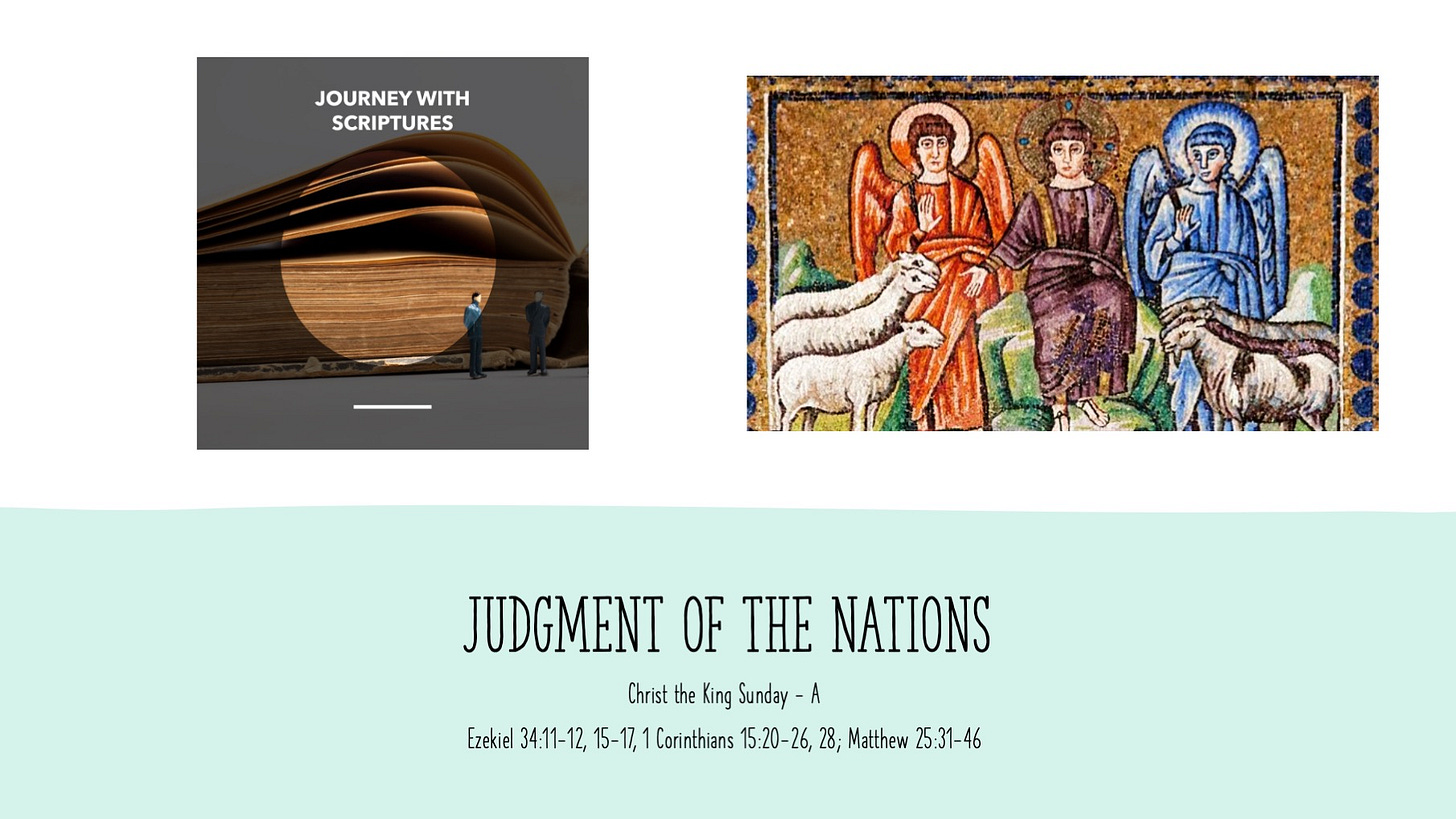Ezekiel 34:11-12, 15-17, 1 Corinthians 15:20-26, 28; Matthew 25:31-46
The idea of judgment over the nations appears already in the Old Testament, and the criterion of that judgment is how these nations treated Israel. "I will gather all the nations and bring them down to the Valley of Jehoshaphat. And I will enter into judgment with them there, on behalf of my people and my heritage Israel, because they have scattered them among the nations and have divided up my land" (Joel 4:2; Ps. 105:14). In today's gospel Matthew gives this idea a new meaning. The criterion according to which the nations will be judged is how they have treated Christ's followers (Matt. 25:40,45).
"When the Son of Man comes in his glory" (Matt. 25:31). Matthew places the vision of the last judgment before the Passion and the Resurrection of Christ (Matt. 26-28). The one who in a moment would be judged and sentenced to death is the one who, sitting on the throne of his glory, judges the nations (Matt. 25:31). Because he humbled himself and became obedient to the point of death on the cross, God exalted him above all things (Phil. 2:9) and subjected everything to him (1 Cor. 15:28). Behold, all the nations gather before him to hear the verdict regarding their eternal destiny.
"He will separate people one from another as a shepherd separates the sheep from the goats" (Matt. 25:32; Ezek. 34:17). On the left, the prophets would place Assyria and Babylon, two ancient empires that destroyed Israel (Nah. 3:1,5,19; Jer. 51:64), and on the right those nations who had joined themselves to the Lord (Zech. 2:15). After two thousand years of history of Christianity, we could put on the left all the empires and nations that persecuted and still persecute Christians, and on the right those that defend religious freedom and allow us to worship freely the name Jesus within their borders.
"For I was hungry" (Matt. 25:35). The King's identification with his suffering brothers and sisters is rooted in the Old Testament. "He who touches you touches the apple of my own eye" (Zech. 2:12) says the Lord to the nations and commands them: "Touch not my anointed ones, do my prophets no harm!" (Ps. 105:15; Gen. 20:3-7). The suffering of Israel touches the heart of God (Is. 57:15; 63:9). The famous statement of Jesus spoken to Saul while he was still persecuting the Church makes it clear: "Why are you persecuting me?" (Acts 9:4). Whatever Saul did to Christ's believers, he did to Christ (Matt. 25:40). However, the nations standing before the Son of Man were not aware of this truth (Matt. 25:37-39, 44).
"As you did it to one of the least of these my brothers" (Matt. 25:40). Who are those least brethren of Christ? How did they appear among all the angels and nations? They belong to Christ and are made alive at his coming (1 Cor. 15:23). They are not subject to judgment, because through faith and baptism they passed from death to life (John 3:18; 5:24). They belong to the family of Christ because they did the will of his Father who is in heaven (Matt. 12:50) and for the sake of the gospel, they became "like the scum of the world", hungry, thirsty, poorly dressed, homeless, sick and persecuted (1 Cor. 4:11-13; Gal. 4:13-14). To them, the Son of Man directs the eyes of all the nations.
"For he must reign until he has put all his enemies under his feet" (1 Cor. 15:25). These enemies are the ruler of this world and death. The eternal fire was prepared for him and his angels (Matt. 25:41) and death will also be thrown into it (Rev. 20:14). But, it was not prepared for people, and if anyone finds themselves in it, then it will be at their own choosing (CCC, 1037). For people, God from the foundation of the world has prepared the Kingdom and the flock of Christ together with those who have shown her mercy will inherit it (Luke 12:32; Matt. 25:34-36).




